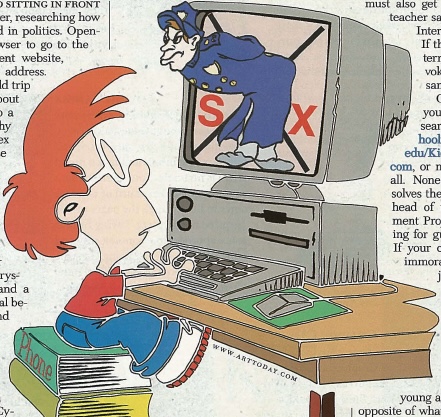Imagine your child sitting in front of the family computer, researching how kids can get involved in politics. Opening an Internet browser to go to the White House government website, he innocently types an address. This student’s on-line field trip to the Oval Office is about to be rudely hijacked to a commercial pornography site featuring graphic sex on its front page, because he got three letters wrong in the address!
Seem far fetched? There really is a porn website with “White House” in its address. From on-line smut to making a fertilizer bomb, mass-producing crystal methamphetamine and a host of felonies, anti-social behaviors, moral no-nos and even terrorist acts–they’re all on the Internet, mixed and mingled with useful knowledge. Filtering companies who attempt to screen sites like this–such as Cyber Patrol, Surfwatch, Cybersitter, Net Nanny and others–tell this story to illustrate just how easily kids can be exposed to porn.
There are various methods to screen websites. Some software programs restrict access with a “blocking” strategy. If the program finds keywords such as “XXX” or “Sex” in a website, either the words themselves are removed or the entire site is restricted and user access is denied. This has obvious limitations, such as blocking a website for Superbowl XXX.
A more sophisticated and popular approach is for programs to automatically search for suspicious pages, then human reviewers look at each page and decide if it should be off-limits. Cyber Patrol follows this method and rates sites according to these categories: violence/profanity; partial nudity; full nudity; sexual acts; gross depictions; intolerance; satanic or cult; drugs and drug culture; militant/extremist; sex education; questionable/illegal and gambling; alcohol and tobacco. Users of Cyber Patrol then decide at home which categories to block.
But it’s not foolproof. “Using a computer with Surfwatch installed on it,” says Bill Lowenburg, a librarian, “I could learn how to build a bomb, contact a satanic cult, sabotage systems within a building, commit crimes using cellular phones and read neo-Nazi propaganda.” And what if you’re sitting in a library and get blocked from educational websites while researching a class project? Most companies block anything controversial, including information like suicide prevention, safe sex and gay youth resources. “I couldn’t access the English Server at Carnegie Mellon University, because it apparently had ‘objectionable’ content on it,” says Lowenburg. Due to constitutional freedom of speech and press issues, debates rage over whether schools and libraries should be denied full Internet access.
Public schools say they have to either use Internet filters or not use the Internet at all. An effective solution is what some schools call an “Internet driver’s license.” A student must sign a document saying that he will not access pornography or illegal activities. He must also get a recommendation from a teacher saying he needs to access the Internet and can act responsibly. If the contract is broken, his Internet license at school is revoked. Parents could use the same approach.
Other solutions include youth-friendly directories and search engines such as www.yahooligans.com, sunsite.berkeley. edu/KidsClick!/ and www.ajkids.
com, or not allowing Internet use at all. None of these methods totally solves the problem. Karen Schneider, head of the Internet Filter Assessment Project, warns, “If you’re looking for guarantees–there are none.” If your child isn’t inclined to resist immoral temptations, then he may just crack the password–given that most kids know more about computers than their parents–or he might go to a friend’s house to surf the Web.
Hinduism’s knowledge of dharma teaches us to plant seeds in a child’s mind at a young age. Sure, he may do just the opposite of what you tell him, but the seeds will mature until one day he will make his own decision based on your personal example, past moral instruction and clear information about the consequences. If dharma isn’t followed–like indulging in pornography, making bombs or drugs–the results range from wasted time to death. One is magnetized to the lower astral (hellish) world of all illegal activities. Childlike innocence is lost. There’s the real danger of landing in jail or getting shot by a drug dealer. And pedophiles lurk on the Internet.
The world is wide open via the information superhighway. Decades ago, you didn’t have to worry as much about youth veering off track, because information wasn’t as readily available, and with all their duties in the joint family, there wasn’t much free time anyway! Today, much Internet material enhances the youth’s traditional path of learning. As a parent, don’t be shy to supervise your kids’ computer adventures. They may not like it, but they do need it.
Internet filter programs can be found at:www.cyberpatrol.com, www.surfwatch.com, www.cybersitter.com
